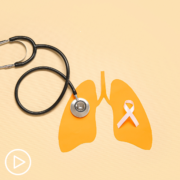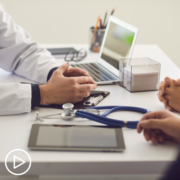A Patient’s Proactive Path to an Acute Myeloid Leukemia Diagnosis
A Patient’s Proactive Path to an Acute Myeloid Leukemia Diagnosis from Patient Empowerment Network on Vimeo.
Meet Paloma, a 58-year-old acute myeloid leukemia (AML) survivor. After experiencing breathlessness, sore gums, and other symptoms that were initially misdiagnosed, she trusted her instincts and sought further medical support, leading to her AML diagnosis. Discover Paloma’s journey and the vital importance of being proactive and staying [ACT]IVATED in your cancer care.
Related Resources:
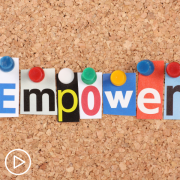
|
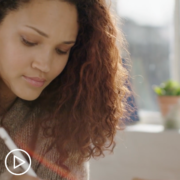
|
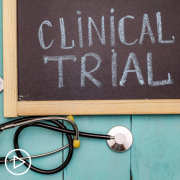
Advice for Acute Myeloid Leukemia Patients Seeking a Clinical Trial |
Transcript:
Being ACTIVATED in your cancer care is critical and also a continuous journey. My name is Paloma, and I’m eager to share my journey as an acute myeloid leukemia patient in the hopes that it will help other patients and families. AML doesn’t discriminate; it can affect anyone, regardless of lifestyle or healthy eating habits.
I was 58 when I was diagnosed with AML, and my diagnosis was pretty shocking to me. I learned that you really need to trust your instincts when it comes to your health. I felt like something was off with my body, but my initial symptoms were only some breathlessness upon exertion and sore gums. But then additional symptoms started including a dry cough, some flu-like symptoms, and lumps under my armpits. I saw my primary care provider, and she prescribed antibiotics and sent me for a chest x-ray that came back without issues.
When my breathlessness worsened along with profound fatigue, my doctor then sent me to get an ECG and additional blood tests to help determine what might be wrong. While I was waiting for my test results, my co-workers noticed that I looked thinner with my skin also being paler than usual. This was just the beginning of my AML journey. My blood tests came back with abnormal hemoglobin and blast levels, and my doctor arranged for me to be admitted to a well-regarded cancer center. I was fortunate that it was only 20 miles away but realize that not all cancer patients are this fortunate.
After seeing my AML specialist at the cancer center, he wanted to start my chemotherapy right away to fight the cancer. I was fortunate that I didn’t have issues with my intravenous line for receiving my chemotherapy. But I learned that this can be a common issue for AML patients after I joined an online AML support group. I had my first round of chemotherapy, and my daughter was able to visit me during this time. However, my care team kept monitoring my neutrophils and decided that I needed to start a second round of chemotherapy. It was now during the COVID-19 pandemic, and hospital visitors weren’t allowed.
I counted myself as fortunate that I could still continue with receiving chemotherapy. What would have happened if I’d gotten seriously ill during the early pandemic? I shudder to think that things likely would not have been easy. The hospital staff helped to keep my spirits up and also with setting up a tablet for me to do video calls with my family and friends while I was in the hospital.
Though that round of chemotherapy put me into remission for a period of time, I later came up as MRD-positive and received a targeted chemotherapy as a third round of therapy followed by a stem cell transplant. I had some graft-versus-host disease issues but got through them. I feel fortunate that there are some different treatment options for AML and would like to participate in a clinical trial to help advance treatments if I need another option on my journey. I’ve kept in touch with other patients in my AML support group during my journey from diagnosis, treatments, and recovery. I know that I couldn’t have gotten through my physical and mental challenges without them.
Though AML sounded scary at first, the future of treatment looks bright to me with emerging research and treatment options. I hope that sharing my story will make a difference for other AML patients and especially those who may come up against barriers.
No matter who you are, being proactive is a critical step in your AML journey. Stay [ACT]IVATED by being informed, empowered, and engaged in your care.

